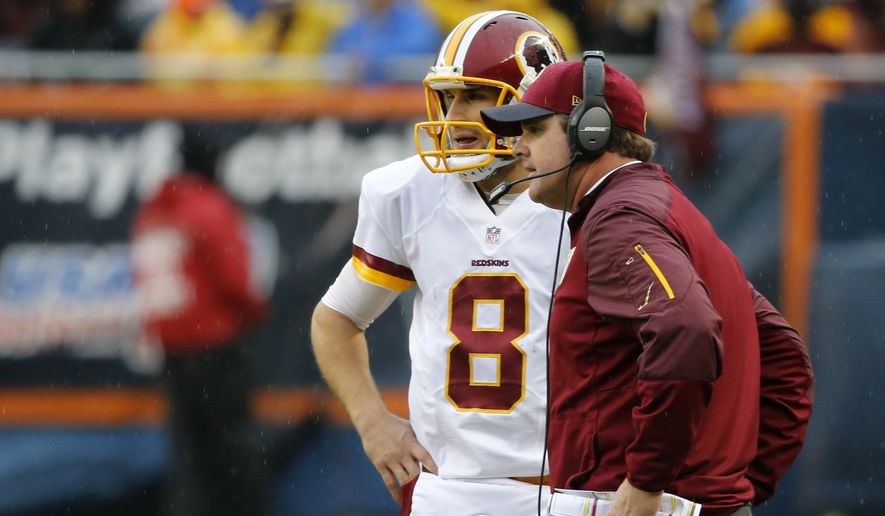ASHBURN — Kirk Cousins said he simply did not see did not see Kyle Fuller lurking in the flat before he floated a pass intended for wide receiver Pierre Garcon down the right sideline.
Late in the third quarter of the Washington Redskins’ 24-21 win against the Chicago Bears on Sunday, Fuller intercepted Cousins’ pass and returned it to the Redskins’ 21-yard line. Three plays later, the Bears tied the score, 21-21, on consecutive rushes from running back Matt Forte.
It was one of the few blemishes in Cousins’ best road performance of the season as he completed 24 of 31 passes for 300 yards and a touchdown.
As Cousins progresses through his first year as a starter, he’s been keen on learning from every situation, good or bad. The lesson he took from Sunday’s interception was not so much to make sure he sees the defender next time, but instead to know what to do when he doesn’t.
“I think it is, ’If you don’t see him, don’t throw it,’” Cousins said on Wednesday. “I think going forward you continue to feel like, ’Hey, if you’re throwing a ball blind, progress and move to the next receiver in the progression or check it down to your outlet to a halfback.’ That would be the coaching point there and you continue to learn from those, just try to avoid throwing a ball that feels like it may be a little blind.”
That lesson is of vital importance as the Redskins close in on the final three games of the season, locked in a three-way tie for first place with the Philadelphia Eagles and New York Giants. Since throwing two interceptions in back-to-back games against the Atlanta Falcons and New York Jets, Cousins’ decision-making has vastly improved. In the seven games since, Cousins has completed 72.1 percent of his passes for 1,886 yards, 12 touchdowns and three interceptions.
There are still moments that would indicate otherwise, like Cousins’ interception on Sunday or the prayer he threw up for tight end Jordan Reed that miraculously ended up in the hands of running back Matt Jones for an 18-yard reception. Overall, coach Jay Gruden is pleased with his quarterback’s progress.
“I think his greatest achievement so far is his ability to progress and get better, really, and study and want to get better and learn and study each opponent on a daily basis, on a weekly basis and understand that there is going to be change involved and adapt to that change,” Gruden said.
“We’re still in the evaluation process but I’m tickled to death to see how much he’s progressed. You can see his confidence just slowly — get more and more, obviously — become more of a factor for him in a good way. He’s still learning, man. He’s still fighting through some things. We’re still coaching the heck out of him but I like where he’s going. I like what he’s about — what he represents as a football player and as a person. We’ll go from there.”
One of those things Gruden is referencing is Cousins’ actions when pressure builds in the pocket. In the last five games, Cousins has been sacked 14 times, including six times in the last two. Against the Bears, most of Cousins’ sacks were not necessarily breakdowns on the offensive line, but coverage sacks.
On Cousins’ first sack on Sunday, he held the ball for nearly five seconds before outside linebacker Willie Young got to him. Left tackle Trent Williams did a good job blocking Young early in the play, but was only able to fend him off for so long. To prevent that, Cousins said, the challenge becomes navigating the fine line between carelessly throwing the ball away and avoiding the sack.
Gruden said the hope is that type of situational awareness will come the more Cousins plays.
“Sometimes you get pinned in that pocket and you can’t escape to the outside because the tackles are pushed in,” Gruden said. “You can’t go up because the guards are pushed up. You have to just, you know, eat it, but I think every situation is different and there will be times — there might have been a time or two in that game — he could have sprinted out of there and maybe thrown it away, but that’s just a matter of playing. I think that will come with experience, I hope.”
• Anthony Gulizia can be reached at agulizia@washingtontimes.com.




Please read our comment policy before commenting.